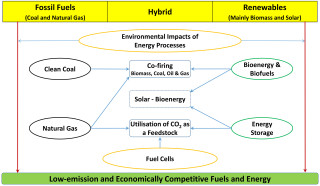Research

Key research in the Institute relates to the following themes:
1. Bioenergy science and engineering
- Biomass gasification for distributed power generation.
- Production of liquid fuels/chemicals and materials from biomass via pyrolysis and bio-refinery.
- Bio-char for soil conditioning and carbon sequestration.
A suite of bioenergy and biofuel technologies developed by the Institute have resulted in the formation of a spin-off company Renergi Pty Ltd.
2. Fuel cells
- High temperature electrochemistry and solid state ionics.
- Development and synthesis of nano-particles, novel catalysts.
- Solid oxide fuel cells, solid oxide electrolysis cells, proton exchange membrane fuel cells, direct methanol fuel cells and high temperature proton exchange membrane fuel cells.
Please contact Professor San Ping Jiang for further details: S.Jiang@curtin.edu.au. Further details are below.
3. Energy storage
- Investigate the properties of high weight % hydrogen storage materials suitable for transport applications such as cars.
- Investigate high temperature hydrogen storage materials suitable for heat storage in concentrated solar power (CSP) applications.
- Investigate the properties of low weight % hydrogen storage materials suitable for CST, static and heavy transport applications.
Please contact Professor Craig Buckley for further details: C.Buckley@curtin.edu.au. Further details are below.
- Develop new ion conductors to be used as solid-state electrolytes in next-generation batteries.
Please contact Dr Mark Paskevicius for further details: M.Paskevicius@curtin.edu.au.
4. Coal science and technology
- Gasification.
- Oxy-fuel combustion.
- Production of liquid fuels and chemicals from the lignite via pyrolysis and refinery.
- Transformation of inorganic species in coal during conversion.
- Utilisation of solid wastes from coal gasification and combustion.
- Others, e.g. coal structure and properties.
5. Natural gas conversion and CO2 utilisation
- Novel membrane – for CO2 utilisation, O2 production and other uses.
- Catalytic and/or electrochemical partial oxidation – for the production synthesis gas, hydrogen, liquid fuels and chemicals.
- Fundamental catalysis.
Please contact Professor Gordon Parkinson for further details: G.Parkinson@curtin.edu.au.
6. Environmental impacts of energy processes
- Life cycle analysis – Analysis of energy balance and CO2 emission in terms of full life cycle.
- Reduction of air pollutants – NOx, SOx, Particulates.
Fuel Cell Research Group
Within the Fuels and Energy Technology Institute of Faculty of Science and Engineering, Curtin University, the Fuel Cell Research Group is being set up with the mission of pursuing fundamental research in fuel cell and practical applications of the electrochemical conversion and storage systems including fuel cells, supercapacitors and water electrolysis as an economical and efficient alternative for green power and energy. The main research areas of the Fuel Cells group are as follows:
- Solid Oxide Fuel Cell (SOFC) – fundamental study of the electrode and electrolyte interfacial reactions and microstructural effect on the electrochemical reaction and transport phenomena; advanced nano-structured electrodes; mechanism of poisoning of anode and cathode, development of poisoning-tolerant electrodes for durable SOFC systems; and development of electrolytes and electrodes-supported tubular and planar types cells and stack systems for natural gas, biomass product gases and biofuels.
- Proton Exchange Membrane Fuel Cell (PEMFC) Development of high efficient Pt-based and non-precious metal-based electrocatalysts; development of novel inorganic high temperature proton exchange membranes based on heteropolyacid functionalized mesoporous silica nanocomposites; synthesis and development of novel highly ordered mesoporous polymeric membranes; development of non-covalent functionalized smart carbon materials as novel catalyst supports; fabrication and characterization of membrane-electrodes-assembly (MEA); design and fabrication of hydrogen and liquid alcohol based PEMFC power systems for specific applications.
- Photocatalytic and electrochemical processes for fuels – Development of high temperature solid oxide electrolysis cells (SOECs) for hydrogen fuels; synthesis of syngas from CO2 and water; fundamental studies of electrode and electrolyte processes of SOECs and their degradation mechanism; development of highly efficient photocatalysts and electrocatalysts for water electrolysis.
- Supercapacitors Development of highly efficient and durable novel carbon and oxide-based electrode materials for supercapacitors; fundamental studies of the charge and discharge process and the microstructural stability of supercapacitor and pseudo supercapacitors; development of supercapacitor systems and devices for practical applications.
Contact the Fuel Cell Research Group
Professor San Ping Jiang
Phone: 61 8 9266 9804
Mobile: 0478325485
Fax: 61 8 9266 1138
Email: s.jiang@curtin.edu.au
Hydrogen Storage Research Group
The Hydrogen Storage Research Group undertakes experimental research into a vast array of energy storage systems including:
- Hydrogen storage materials for export, transport, or stationary energy storage
- Thermal batteries using thermochemical energy storage
- Solid-state electrochemical batteries
